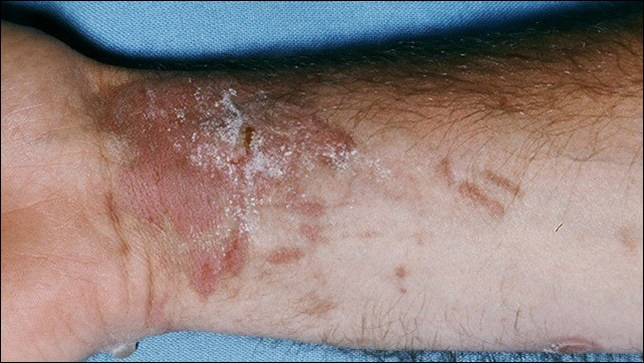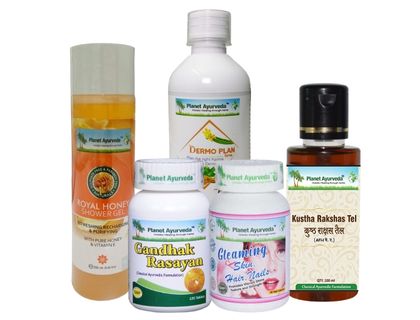Alternative Ayurvedic Treatment For Phytophotodermatitis
Abstract
Dermatitis is a common condition that can occur due to many causes. Dermatitis is a word to describe a number of skin inflammatory conditions. Dermatitis can result in rashes, blisters, dry skin, hyper or hypopigmentation, itching, flakes, and oozing. Phytophotodermatitis is one among these skin inflammatory conditions. Phytodermatitis is an inflammatory condition that can result from an excessive response to a chemical. This condition is quite disturbing and discomforting. We shall discuss the condition of photodermatitis in detail along with its management in the contemporary system of medicine as well as in the Ayurvedic system of medicine. Let’s discuss it!!

Introduction
Phytophotodermatitis can be understood by splitting its words – phyto stands for plants, photo stands for ultraviolet radiation of the sun and dermatitis denotes skin inflammation. So by adding all of these it suggests that phytophotodermatitis is an inflammatory skin condition that results from the reaction of the skin when come in contact with some plant chemical and then exposed to the sunlight.
Phytophotodermatitis is also known as breloque dermatitis or margarita photodermatitis. These chemicals are known as furocoumarins. These chemicals are found in some of the plant families. And exposure or contact with these chemicals results in inflamed and irritated skin. In Ayurveda, the condition can be understood with the rakta and pitta dosha dushti due to aagantuj reason. Now let’s see the causes, classification, features, management, and Ayurvedic aspect of the condition.
Causes of Phytophotodermatitis
- Phytophotodermatitis is a condition that comes from certain plant chemicals which belong to the families – Apiaceae, Rutaceae, Moraceae, and Fabaceae.
- Sunlight
- Ultraviolet rays
Signs and symptoms
- Usually, the reaction starts within twenty-four hours after exposure, and the condition peaks on the second to the third day.
- Erythema
- Edema
- Large blisters (vesicles or bullae)
- Delayed hyperpigmentation
- Heat and moisture aggravate the condition
- Eye exposure to the agent can result in temporary to permanent blindness
Investigations
Physical examination and proper history taking.are necessary things that make the diagnosis easier.
Differential diagnosis
- Hives (Urticaria)
- Skin infections
Prevention
- Avoid contact with the plants of above said families and other agents that are regarded to have phototoxic reactions.
- In places, where contact with such phototoxic agents is inevitable then wearing long clothes that properly cover the skin, is necessary. Handling of such plants should be performed only after wearing proper gloves and eye guards.
- Applying sunscreen is a must thing to do.
- Washing clothes and skin after getting in contact with these phototoxic agents.
- Do not go out if it is not necessary.
Management
- Anti-histamines
- Anti-inflammatory
- Skin whitening agents
- Sunscreen lotions
Ayurvedic Aspect and Management of Phytophotodermatitis
Ayurveda is a traditional medicinal system of the Indian subcontinent which has been serving humanity from old ages. And till today its concepts are rational, valid and fruitful, and result-oriented. There are various skin conditions mentioned in the Ayurvedic texts which usually result from the pitta and rakta dushti. This condition of phytophotodermatitis which is an inflammatory skin condition that can be best correlated with the Aagantuj reasons (foriegn reasons) which vitiates the rakta and pitta (bhrajaka pitta) duhti. This is a dushti due to nisaar janya aagntuj nidan. There is no proper Ayurvedic term for this condition but the condition can be well understood how and which dosha gets vitiated as we saw above. Furthermore, this results in pidika (blister), kandu (itching), shotha (inflammation), vyanga (hyperpigmentation) at the placer post-blister. These symptoms get worse after exposure to sunlight or UV rays.
The management protocol depends on soothing and cooling the skin and pacifying the rakta and pitta dushti. There are a number of herbs that beautifully manage the rakta and pitta dushti. The herbs include Chandan (Santalum album), manjishtha (Rubia cordifolia), neem (Azadirachta indica), sariva (Hemidesmus indicus), kumari (Aloe barbadensis), khadir (Areca catechu), haridra (Curcuma longa) and various others. Some of the various ayurvedic formulation which helps in phytophotodermatitis is gandhak rasayan, mahamanjisthadi kwath, khadirarishta, panch tikta ghrita guggulu, sarivadyarishta, chyawanprash, etc.
Herbal Remedies for Phytophotodermatitis by Planet Ayurveda
Planet Ayurveda is an eminent GMP-certified, ISO 9001:2015 certified and US-FDA registered Ayurvedic Company, which adheres to the objective of manufacturing quality Ayurvedic products as mentioned in a number of ancient texts of Ayurveda. Formulations are manufactured without additives and preservatives and other kinds of chemicals or artificial flavoring agents which can have a number of side effects on the human body. Products manufactured at Planet Ayurveda are pure and devoid of any kind of adulteration. The products are purely organic, vegetarian, gluten-free, and halal-certified. Planet Ayurveda presents its product that effectively manages the condition of Phytophotodermatitis.
Following is the list of formulations that are helpful in managing Phytophotodermatitis
Product List
1. Gleaming Skin Hair Nails Formula
2. Gandhak Rasayan
3. Kustha Rakshas Tel
4. Royal Honey Shower Gel
5. Dermo Plan Syrup
Product Description
1. Gleaming Skin Hair Nails Formula
Gleaming Skin Hair Nails Formula is a product of Planet Ayurveda that is composed of standardized extracts of the herbs like manjistha (Rubia cordifolia), pit pada (Fumaria officinalis), sariva (Hemidesmus indicus) and kumari (Aloe barbadensis). It pacifies the pitta dosha and does rakta shodhana (blood purification). With its blood-cleansing properties, it rectifies the pitta and rakta dusti hence helping in overcoming this discomforting condition of phytophotodermatitis.
Dosage: One capsule twice daily with plain water after meals.
2. Gandhak Rasayan
Gandhak Rasayan is a classical formulation in tablet form and contains shuddha gandhak (purified sulfur). Gandhak Rasayan benefits the body in a number of conditions. It reduces fever, treats skin conditions such as rashes and blisters, and acts as a potent antimicrobial, antiviral, antibacterial, anti-inflammatory, anthelmintic, antioxidant, and antipyretic agent. With all these properties Gandhak Rasayan is beneficial in phytophotodermatitis as it reduces rashes and inflammation of the skin through its anti-inflammatory properties. And also soothes the skin and provides a healthy skin.
Dosage: Two tablets twice daily with plain water after meals.
3. Kustha Rakshas Tel
Kustha Rakshas Tel is a classical ayurvedic formula action that has been in use for managing a number of skin disorders such as dermatitis, leprosy, itching, inflammation, etc. the ayurvedic oil is made up of reasons (Allium sativum), bakuchi (Psoralea corylifolia), aragwadha (Cassia fistula), shuddha parada (purified mercury), shuddha gandhak (purified sulfur), rasa sindoor (combination of mercury and sulfur), Tamra bhasma (calcined copper), manahshila (arsenic sulfide) and mustard oil. With its skin-soothing properties and anti-inflammatory action it is best used in phytophotodermatitis.
Dosage: Wash the affected area with some mild herbal soap or shower gel and apply this oil at least 2 – 3 times a day.
4. Royal Honey Shower Gel
Royal Honey Shower Gel is a herbal shower gel prepared by Planet Ayurveda. It is a gel prepared with honey, aloe vera (Aloe barbadensis), tea tree extract (Melaleuca alternifolia), and other things. The shower gel soothes and cools the skin thus helpful in managing the itching, rashes, and other symptoms caused by phytophotodermatitis with its antibacterial, anti-inflammatory, and other skin-benefitting properties.
Dosage: Take a few drops of shower over the wet lofa and with the help of it apply it over the skin gently and make leather. After that rinse it with water.
5. Dermo Plan Syrup
Dermo Plan Syrup is a polyherbal product of Planet Ayurveda that provides skin wellness. The syrup contains the extract of the herbs including manjistha (Rubia cordifolia), giloy (Tinospora cordifolia), chopchini (Smilax china), sariva (Hemidesmus indicus), neem (Azadirachta indica), khadi (Areca catechu), Haridra (Curcuma longa), shobhanjan (Moringa oleifera), gorakhmundi (Sphaeranthus indicus) and others. The verbs are known to be varna (promotes skin lightening), blood purifying, and pitta pacification properties. With these wonderful properties, the syrup is the best remedy to manage phytophotodermatitis.
Dosage: Two tsp twice daily with plain water after meals.
CONTACT PLANET AYURVEDA TO PROVIDE YOU WITH THE COSTING / ORDERING AND DELIVERY INFORMATION AT – COSTING.PLANETAYURVEDA@GMAIL.COM OR CALL AT +91-172-5214040
Conclusion
Phytophotodermatitis is a type of skin inflammation, particularly contact dermatitis. The condition occurs due to contact with certain plant chemicals that cause inflammation, blister, rashes, and itching at the site of the contact followed by exposure to sunlight or ultraviolet rays. These chemicals are known as furocoumarins, which are present in some plant fancy families. One can prevent the condition by following some preventive measures as we discussed above. In the modern system of medicine, there are antihistamines and anti-inflammatory medicines are used that suppress the symptoms super soon but hurt in another way of side effects. Whereas, Ayurveda offers a good management protocol that rectifies the vitiated pitta and rakta dosha which eventually helps the management of the condition and enhances the beauty of the skin, providing good and healthy skin free of diseases. Hence Ayurveda manages skin disorders more efficiently than any other system. The products mentioned above provide good results in the condition of phytophotodermatitis. Choosing Ayurveda !! Choose healthy skin !!




